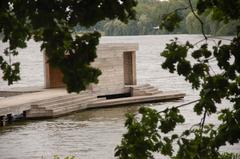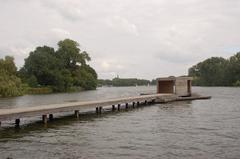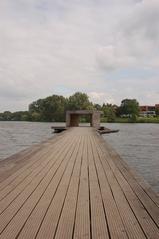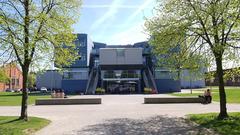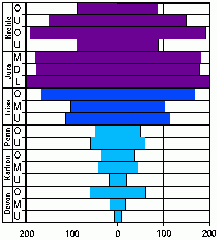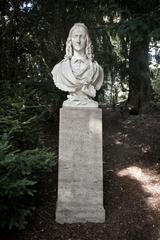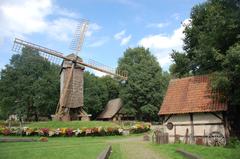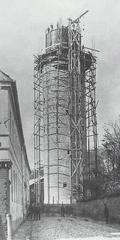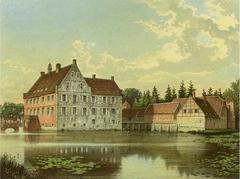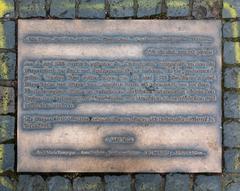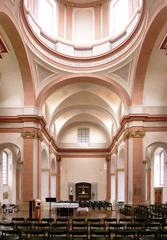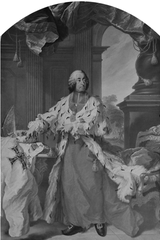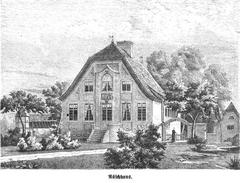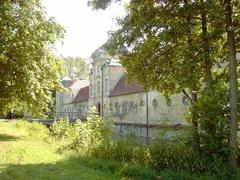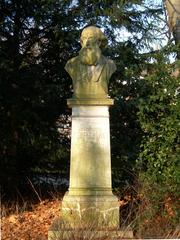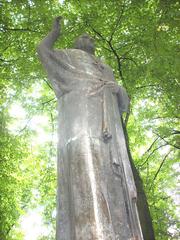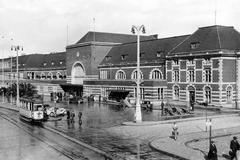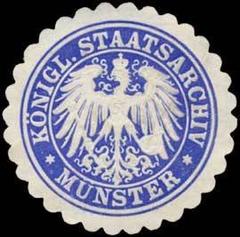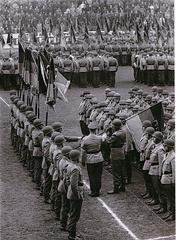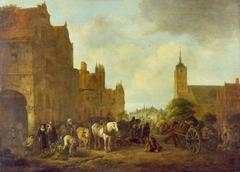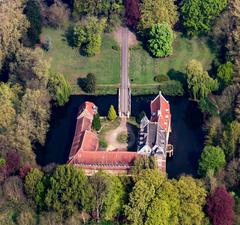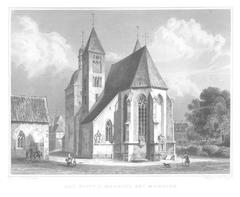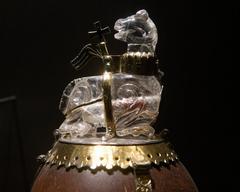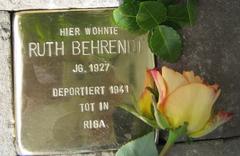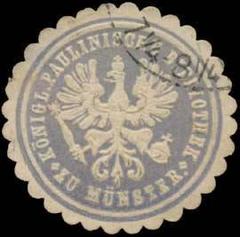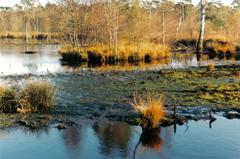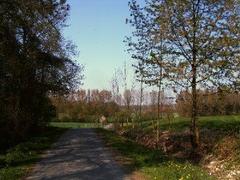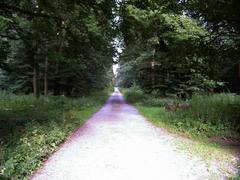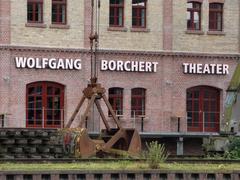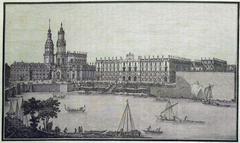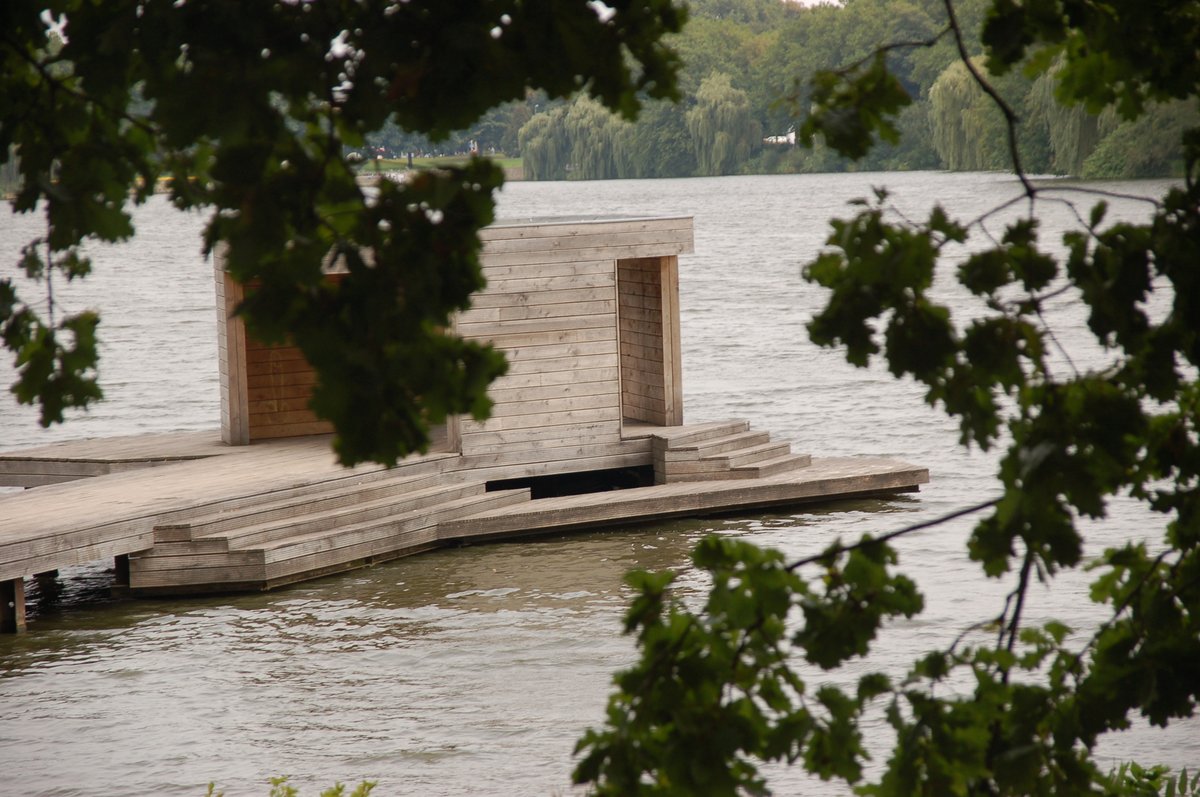
Pier Münster, Germany: Visiting Hours, Tickets, and Travel Guide
Date: 14/06/2025
Introduction: Exploring Münster’s Waterfront and Cultural Landmarks
Münster, Germany, is celebrated for its rich tapestry of history, architecture, and vibrant urban culture. Among its standout attractions are the revitalized Münster Harbor (Stadthafen) and the striking Pier at the Aasee (Lake Aa), both of which reflect the city’s unique blend of industrial heritage, modern creativity, and commitment to public art.
The Münster Harbor, once a bustling 19th-century industrial port, has transformed into a lively creative and cultural district. Preserved warehouses now house art galleries, restaurants, and music venues, while the waterfront hosts festivals and community events (r-ein.de, myhappyplaces.de). In contrast, the Pier Münster at the Aasee—an innovative public artwork by Jorge Pardo—exemplifies Münster’s embrace of contemporary culture, sustainability, and inclusivity in urban spaces (Europe for Visitors, Stadt Münster).
Complemented by nearby historic sites like the Prinzipalmarkt and Münster Cathedral (St.-Paulus-Dom), Münster offers visitors a journey through centuries of architectural splendor, creative innovation, and community vibrancy. This comprehensive guide details visiting hours, ticketing, accessibility, local attractions, dining, nightlife, events, and essential tips for making the most of your Münster experience (stadt-muenster.de, Germany Travel).
Table of Contents
- Introduction
- Münster Harbor: History and Revitalization
- Visiting Münster Harbor
- Pier Münster at the Aasee
- Exploring Münster’s Historic Center
- Practical Visitor Tips
- Frequently Asked Questions (FAQ)
- Conclusion
- Sources
Münster Harbor: Industrial Heritage Meets Urban Creativity
Origins and Industrial Significance
The Münster Harbor owes its beginnings to the construction of the Dortmund-Ems Canal in the late 19th century. Opened in 1899, it quickly became a key inland port, shipping coal, building materials, and agricultural goods to and from the Ruhr region (r-ein.de). The harbor’s classic industrial architecture—warehouses, silos, and canal-side infrastructure—became integral to Münster’s cityscape.
Wartime Impact and Postwar Recovery
During World War II, the harbor sustained heavy damage from Allied air raids targeting industrial assets. Despite this, it was restored and resumed operations shortly after the war, with the Stadtwerke Münster overseeing a period of reconstruction and modernization (r-ein.de).
Creative Revival and Urban Planning
By the 1970s, traditional harbor activities declined, prompting a shift toward creative redevelopment. Artists and cultural groups began repurposing empty industrial buildings. The 1990s “Kreativkai” (Creative Quay) initiative accelerated this transformation, blending preserved architecture with contemporary design and new public spaces. Today, the area is a model of participatory urban planning, with the “MünsterZukünfte 20|30|50” initiative promoting sustainable and inclusive development (stadt-muenster.de).
Architectural Highlights
A notable example of adaptive reuse is the “Harbor Gate” (Hafentor) complex by Jan Kleihues and Norbert Hensel—a trio of contemporary buildings integrating office, residential, and cycling infrastructure in harmony with the historic surroundings (kleihues.com). Other landmarks include the Hafenkäserei (artisan cheese dairy and event space) and the Hot Jazz Club, both local favorites (myhappyplaces.de).
Visiting Münster Harbor
Hours, Tickets, and Tours
- Public Access: The harbor district is open year-round, accessible at all times. Most venues and restaurants operate from morning until late evening.
- Tickets: No ticket is required to enter the harbor area. Admission fees may apply for exhibitions or events at specific venues such as Kunsthalle Münster or B-Side.
- Guided Tours: Walking tours focusing on the harbor’s industrial and cultural history are available via local tourism offices and event organizers.
Attractions and Social Scene
The harbor promenade is ideal for photography, especially near the Harbor Gate and Petershafen basin. Social hotspots include Pier House, Café Med, Hot Jazz Club, and Rote Lola, offering a lively mix of dining and live music (abenteuer-muenster.de). Annual events like the Hafenfest and boat cruises on the MS Günther add to the district’s appeal.
Accessibility and Getting There
- Location: Easily reached from Münster’s city center by foot, bicycle, or public transport.
- Cycling: Ample bike parking supports Münster’s cycling culture.
- Wheelchair Access: Promenades and most venues are wheelchair accessible.
Pier Münster at the Aasee: Art, Modernity, and Community
Design and Cultural Role
Designed by artist Jorge Pardo, the Pier on the Aasee is a striking fusion of public art, architecture, and landscape. Its distinctive pavilion extends into the lake, inviting visitors to relax, socialize, and experience art in dialogue with nature (Stadt Münster). The Pier is part of Münster’s legacy of integrating permanent public artworks from the Skulptur Projekte exhibitions (Europe for Visitors).
Visiting Hours, Tickets, and Accessibility
- Hours: Open year-round, 24/7 as a public space. Daylight hours (9:00 AM to sunset) are recommended for safety and enjoyment.
- Tickets: Free public access; no admission required.
- Accessibility: Ramps and wide walkways ensure the Pier is accessible for wheelchairs, strollers, and bicycles.
Nearby Attractions and Activities
- Aasee Parklands: Ideal for walking, cycling, boating, and picnicking.
- Museums: LWL Museum of Natural History, Picasso Museum, and Westphalian State Museum of Art and Cultural History are all nearby (Travel in Culture).
- Events: The Pier hosts open-air concerts, yoga classes, art workshops, and is a highlight during the annual “Schauraum” festival (Münsterland Tourism).
Dining and Nightlife
Lakeside venues like Kruse Baimken and Aaseeterrassen offer regional cuisine and views of the water. Münster’s Altstadt and harbor district provide a range of options, from casual cafes to lively clubs such as Heaven and the Hot Jazz Club (MyGermanCity.com).
Exploring Münster’s Historic Center
Prinzipalmarkt: The Heart of the Old Town
The Prinzipalmarkt is Münster’s medieval marketplace, famous for its gabled facades and arcades. It remains the city’s commercial and social center, hosting seasonal markets and cultural events throughout the year.
Münster Cathedral (St.-Paulus-Dom)
A masterpiece of Romanesque and Gothic architecture, the Münster Cathedral features notable artworks and the 16th-century astronomical clock. It is open daily, with free entry; guided tours and special exhibitions may require tickets.
Transportation and Accessibility
- By Train: Münster Hauptbahnhof connects to major German cities and regional airports.
- By Bus and Bike: The city’s extensive bus network and over 450 km of cycling paths make exploring easy and sustainable.
- Accessibility: Low-floor buses, tactile guidance, and flat sidewalks facilitate mobility for all visitors.
Practical Visitor Tips
- Weather: Bring waterproof clothing—rain is frequent year-round.
- Language: German is predominant; English is widely spoken in tourist areas.
- Safety: Münster is safe and well-policed.
- Tourist Info: The Tourist Information Center near Hauptbahnhof offers maps, multilingual assistance, and the “Explore Münster” app.
- Accommodation: Options range from hostels to luxury hotels, many of which are bike-friendly.
- Etiquette: Respect cyclists’ right of way and validate public transport tickets before boarding.
- Connectivity: Free Wi-Fi is available in public spaces.
Frequently Asked Questions (FAQ)
Q: What are the visiting hours for the Münster Harbor and Pier?
A: Both are open year-round, with the harbor accessible at all times and the Pier recommended during daylight hours.
Q: Are tickets required for entry?
A: No, both areas are free to access. Some exhibitions or guided tours at individual venues may require tickets.
Q: Are guided tours available?
A: Yes, walking tours of the harbor and public art tours including the Pier are offered by local tourism providers.
Q: Is the area accessible for people with disabilities?
A: Yes, both the harbor and Pier have wheelchair-accessible paths and facilities.
Q: What are the best times to visit?
A: Spring through autumn is ideal for outdoor activities and events.
Q: Can I rent a bike or boat near the Pier?
A: Yes, rentals are available around the Aasee.
Conclusion: Embrace Münster’s Dynamic Spirit
Münster’s Pier and Harbor districts showcase the city’s remarkable blend of historical heritage and creative modernity. From the industrial legacy of the Stadthafen to the contemporary artistry of Jorge Pardo’s Pier, visitors are treated to an immersive urban and cultural experience. Coupled with the architectural wonders of Prinzipalmarkt and Münster Cathedral, your journey through Münster will be both enriching and accessible.
For up-to-date event information, guided tour bookings, and interactive city guides, consult the official tourism websites or download the Audiala app. Embrace the best of Münster—where history, art, and community converge.
Sources
- Visiting Münster Harbor: History, Attractions, and Practical Tips, 2025, r-ein.de
- Pier Münster: Visiting Hours, Tickets, and Cultural Significance of Münster’s Iconic Aasee Landmark, 2025, Europe for Visitors
- Jorge Pardo’s Pier in Münster: Hours, Tickets, and Nearby Attractions, 2025, Stadt Münster
- Exploring Münster’s Prinzipalmarkt and Münster Cathedral: Visitor Guide, Accessibility, and Transportation, 2025, Stadt Münster
- MünsterZukünfte 20|30|50 Initiative, 2025, Stadt Münster
- Top 10 List: What to Do in Münster, 2025, Abenteuer Münster
- Travel in Culture: Things to Do in Münster Germany, 2025, Travel in Culture
- Germany Travel: Münster, 2025, Germany Travel
